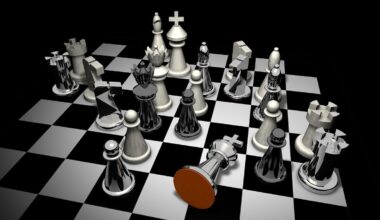Balancing Individual Player Development with Team Goals
Coaching basketball involves a unique challenge: nurturing the development of each athlete while also achieving the collective goals of the team. This dual focus is essential for successful coaching as players’ contributions arm a team with resilience and adaptability. It’s vital to recognize that enhancing individual skills can directly benefit the team’s overall performance. Coaches should develop tailored training programs that focus not merely on skills but also on teamwork dynamics. A comprehensive plan can ensure that all players understand their roles and responsibilities. Incorporating skill development within practice sessions enables players to hone their abilities while contributing towards team objectives. For effective implementation, coaches might start with one-on-one sessions to build confidence in individual players, followed by drills that encourage cohesive teamwork. Transparent communication will reinforce players’ understanding of how their development impacts the team. Engaging each athlete in discussions about their goals will personalize their experience and foster motivation. Through evidence-based practices and ongoing feedback, coaches can achieve a harmonious blend of individual and team successes that will resonate throughout the season and beyond.
It’s essential to create an environment that celebrates individual achievements in the context of the team’s aspirations. Players thrive when they feel valued and recognized for their unique strengths. To facilitate this, establish individual player goals alongside team objectives. For example, if the team aims to enhance its defense, a player’s goal may focus on improving individual defensive skills. Consistently reinforcing this link between personal growth and team progress fosters mutual respect and teamwork. As a coach, implementing regular assessments helps to track individual and team performance. These evaluations can inform whether personal goals are being met while adjusting strategies for overall team enhancement. Coaches should not overlook the emotional aspects; building strong interpersonal relationships within the team can help individuals feel more committed. Encourage peer-to-peer learning where players educate each other on their skills. Team-building exercises also play a crucial role in ensuring that players feel a sense of belonging and commitment to the squad. Ultimately, basketball coaching thrives when both elements—individual and team development—are approached with balance and foresight, paving the way for lasting success on and off the court.
Integrating Individual and Team Training
Integrating individual training with team practices is critical for achieving a balanced approach in coaching. Coaches should strategically design drills that cater to both aspects, allowing players to work independently while also collaborating with teammates. For instance, during scrimmages, assign specific roles based on players’ individual strengths. This scenario not only promotes personal growth but reinforces the understanding of how each role contributes to team dynamics. It’s equally important to employ drill variations that adjust according to the team’s collective needs. When players can appreciate how their skills benefit the entire squad, it fosters a culture of accountability. Moreover, utilizing technology such as video analysis can demonstrate individual performances within team settings. This feedback helps players refine their skills and understand their role in a larger context. Emphasize that while individual prowess is necessary, the ultimate goal is team synergy. As players begin to appreciate this duality, they may develop a stronger sense of commitment, both to their own improvement and to the aspirations of their teammates. This balance leads to a cohesive team environment, greatly enhancing competitive performance throughout the season.
Maintaining motivation is another key element in achieving this balance in coaching. Individual players often require different levels of support, and recognizing this can lead to more tailored coaching methods. Regularly revisiting and adjusting personal goals ensures that individual players remain engaged and invested in their development. Coaches should be proactive in organizing motivational activities that showcase both the importance of personal success and team achievements. This could involve inviting professionals to provide workshops on mental strength and resilience. Celebrating milestones, whether individual or team-based, fosters a positive environment where players feel encouraged to share their wins. As competition increases, emphasizing a consistent culture of growth and support will aid in sustaining motivation and perseverance, even during challenging moments. Recognize that individual drop-offs in performance can affect team morale, so integrating team spirit could revitalize a player’s focus. By cultivating a mindset of collective effort, players are more apt to push one another towards excellence, ultimately driving the overall performance of the team upward. This dynamic can be a captivating journey, deepening player relationships and cultivating a passion for the sport.
Adaptability in Practice Drills
Incorporating adaptability in practice drills is essential to meet the varying needs of players while aligning with team goals. Coaches should embrace flexible methodologies and an arsenal of drills that cater to different skill levels. For instance, agility drills can be modified to hone individual skills while incorporating team play strategies. Recognizing that each player learns differently will enhance the practice experience. Thus, while focusing on personal improvement, encourage players to assist one another during drills, which can deepen their understanding of teamwork. Utilizing varied types of feedback—verbal, demonstration, and correction—supports diverse learning preferences ensuring everyone makes progress. Additionally, exploring small group practices allows players to receive more focused attention, leading to personalized strategies. By maintaining a versatile approach, you empower players to take ownership over both their development and their contributions to the team. Moreover, including fun, competitive elements into drills can further motivate players by creating an enjoyable training atmosphere. Players are more keen to engage in practices when they see how their contributions impact both their personal growth and the team’s success. This balance of adaptability and enjoyment enhances a team’s cohesion, allowing them to achieve collective success in competitions.
To solidify this concept of balancing individual and team goals, continuous reflection and recalibration are paramount. Coaches should implement a routine of feedback sessions with players to discuss progress, what is working, and potential areas for adjustment. This process not only reinforces the importance of both personal and collective growth but also empowers players with agency over their development. By regularly measuring outcomes against initially set objectives, coaches can foster a culture of growth where players feel informed and involved. Additionally, creating a shared vision, wherein players contribute to setting team aspirations, allows for deeper commitment. When players understand that their contributions are integral, it strengthens their resolve to develop personally, thereby benefiting the team. Encourage an environment of open dialogue where players can voice concerns and celebrate achievements collectively. By cultivating trust, players are more likely to support each other both on and off the court. Use this reflection phase to not only address challenges but also acknowledge successes. Celebrating those milestones as a team boosts morale and stirs excitement towards continuous development for each individual as well as the team as a whole.
Final Thoughts on Team and Player Goals
In conclusion, effective basketball coaching hinges on the delicate balance between fostering individual player growth and achieving the team’s overarching goals. The synergy that develops through this balance provides a winning formula that nurtures athletes both on and off the court. As coaches, it’s essential to recognize that when players excel individually, the entire team’s performance is fortified. Prioritizing both aspects in practice and during games creates an atmosphere of cohesive teamwork, elevating all players’ contributions. Coaches must remain adaptable, implementing varied strategies that resonate uniquely with each player, ensuring personalized engagement while aligning with team dynamics. Encouraging communication, celebrating successes, and being open to feedback cultivates an inclusive environment where every athlete feels valued. Ultimately, the goal of basketball coaching transcends winning; it’s also about developing character, work ethic, and lifelong friendship among players. By continuously cultivating both individual talents and emphasizing the importance of team success, coaches will witness a transformation within their teams, where players genuinely strive for their best, not just for themselves, but for each other as well. This process establishes a legacy of teamwork that will last long beyond the final buzzer.
This is a final concluding paragraph reiterating the importance…





